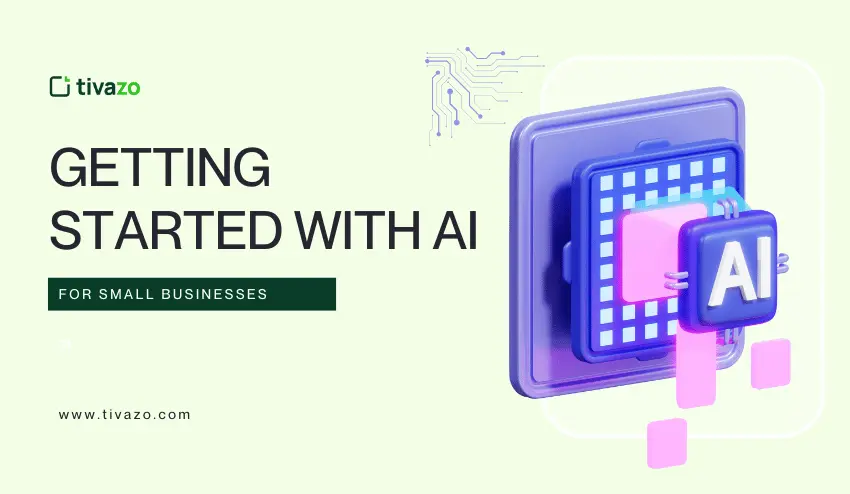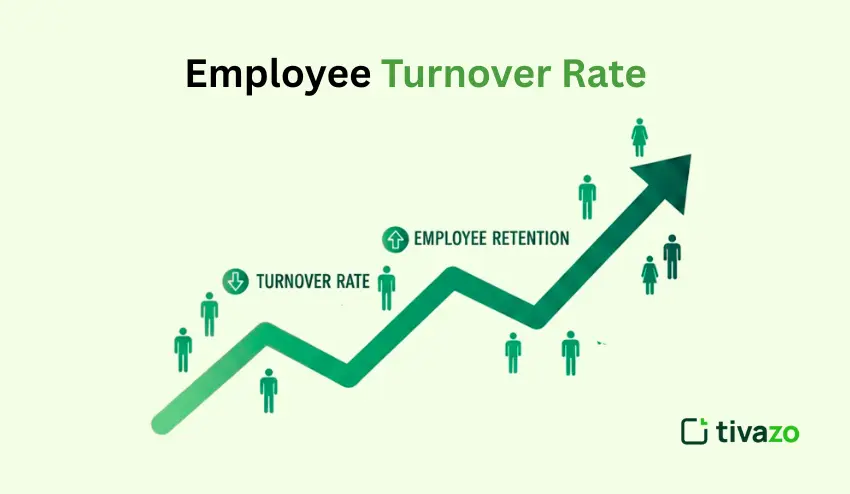Artificial Intelligence is no longer solely for the benefit of large technological organizations. In this modern era, small businesses can also take advantage of AI because it has become simple to use, budget-friendly, and very helpful. AI can help small businesses and organizations in numerous ways, such as cutting down on extra expenses, saving precious time, and connecting with customers in a better way. Like, it can be utilized for answering queries of customers automatically and enhancing their overall marketing. Many small teams are also introducing simple voice APIs into their workflows, letting customers get quick, natural responses through phone menus or voice-driven assistants, something that used to require complex enterprise software.
Unfortunately, some small businesses are not properly aware of using AI. Some thought that it is expensive, while others may think it’s complex to use or where they should begin. But in reality, either a small business or a big tech company doesn’t need any high expertise to use AI to improve their businesses. With relevant tools and a positive attitude, any business can use AI to boost its business.
In this useful guideline, we will discuss eight easy but effective strategies through which small businesses can start with AI to enhance and grow their companies.
8 Strategies for How Small Businesses Can Get Started with AI
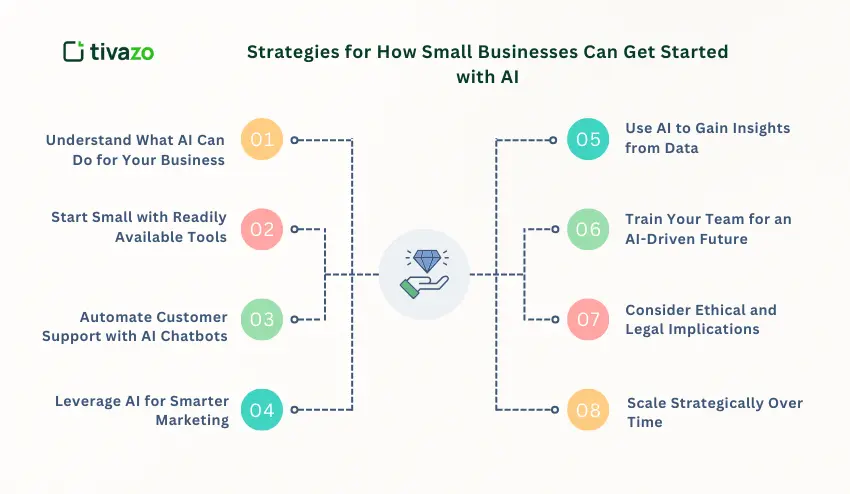
1. Understand What AI Can Do for Your Business:
Significantly, before investing money or time, small business owners must first know what Artificial Intelligence is. Dr. Nick Oberheiden, Founder at Oberheiden P.C., asserts, “AI is considered the most powerful machine or system that copies human intelligence for performing different simple or difficult tasks and improving the overall development of businesses based on the information it gathers. In small businesses, AI does not need to be complex or futuristic. It performs different tasks easily, from email auto response to predictive sales forecasting.”
To begin, small businesses can list down all the time-wasting, repetitive, and error-prone tasks, such as:
- Do you need hours to handle inventory manually?
- Are you facing issues like overwhelmed customer support agents with ordinary queries?
- Are you unable to understand why customers are leaving your business frequently?
Then search for those AI tools that can solve these issues effectively. The main reason behind using Artificial Intelligence is not to become modern but to overcome actual pain points. Once you have highlighted your business’s main needs, the benefits of AI can easily become efficient, measurable, budget-friendly, and make customers satisfied and stick with your services in the long term.
2. Start Small with Readily Available Tools:
Most of the owners of the small businesses believed that they required those AI solutions that are custom-based, which can be costly and require expertise. In reality, custom AI development and multiple Ai tools are user-friendly, and business owners can use them on a subscription basis or even use their free versions. These tools are highly developed for non-technical users and do not require a high level of expertise or coding skills.
Such as:
- Canva’s Magic Write: It plays an essential role in making social media posts and ads with content creation that is AI-based.
- Zapier: It is another AI tool that flawlessly automates activities across different platforms, like storing Gmail attachments to your Google Drive.
- QuickBooks: This tool is also AI-based and helps in tax predictions and automated accounting.
By using any of these tools in their small businesses, customer services, or for marketing purposes, owners can get an idea about how AI works effectively before expanding. And how AI adds value to their businesses and boosts their development.
3. Automate Customer Support with AI Chatbots
One of the most effective, budget-friendly, and useful tools used worldwide is the Chatbot for small businesses. “AI Chatbots play a fundamental role in overcoming the customer service team’s burden of managing routine queries, such as What are your working hours? Or, where has my parcel reached? In addition to this, it is very simple to download modern Chatbot platforms on social media and websites, and they also facilitate with drag-and-drop interfaces,” says Timothy Allen, Director at Corporate Investigation Consulting. They do not need any kind of coding, and businesses can customize it to reflect the style and tone of their brand. Plus, companies can choose from different types of chatbots depending on their goals — whether they want to automate FAQs, provide real-time support, or drive sales conversions
Some essential platforms to take into consideration:
- Tidio: This platform is incorporated with WhatsApp, Shopify, and Facebook Messenger.
- Chatfuel: It is specifically developed for the purpose of Instagram and Facebook automation.
- Zendesk Answer Bot: Ideal for organizations already using Zendesk for ticket support, and a popular choice when looking for a Zendesk alternative.
As your business booms, Chatbots can evolve with you, improving past conversations and facilitating customers with more relevant responses. As your business booms, AI Chatbots can evolve with you, improving past conversations and facilitating customers with more relevant responses. They can also benefit from lead collecting, appointment scheduling, and payment processing, making it an ideal investment for multiple purposes. They can also benefit from lead collecting, appointment scheduling, and payment processing, making it an ideal investment for multiple purposes. For businesses using WhatsApp as a primary communication channel, WhatsApp forms can streamline data collection by allowing customers to complete surveys and forms directly within their chat.
4. Leverage AI for Smarter Marketing:
Well, for small businesses, marketing can be one of those areas that is most resource-intensive. Range from creating useful content to targeting ads. Artificial Intelligence plays a crucial role in reducing the time spent on doing tasks manually and increasing their effectiveness.
AI can help in numerous ways, such as:
- Segmentation of Audience: It helps in understanding the basic needs of the audience on the basis of their preferences and behavior.
- Optimization of Emails: You can send emails automatically to your customers with the help of tools like MailChimp at optimal times.
- Content Creation: In addition to this, tools like Grammarly, Jasper, and Copy AI facilitate generating premium-quality content with accurate grammar, refined tone, and readability.
- Ad Performance: Facebook ads and Google ads utilize AI to optimize their campaign performance in real-time, helping small businesses achieve the best ROI from their investment by boosting profitability.
- Video Marketing: Since video has become one of the most engaging content formats, many marketers now rely on an AI-powered video editing tool that can instantly trim footage, auto-caption, and repurpose clips for different platforms, reducing both editing time and production costs.
Instead of making yourself worried about which campaign might work for your business, let the AI tool analyze the overall history of performance data and suggest the best strategies for the future. In this way, you can not only save your precious time but also enhance customer retention, conversion rates, and brand loyalty.
5. Use AI to Gain Insights from Data
One of the most attractive and powerful characteristics of Artificial Intelligence is that it has the ability to switch from huge amounts and provide actionable insights. In addition to this, days are considered a New Currency, but unfortunately, without using accurate tools, it’s useless. AI acts as a bridge by changing raw data into effective business intelligence, enabling small businesses to create a competitive intelligence report that informs smarter strategic decisions. For founders, one of the most powerful ways to apply AI-driven insights is through real-time business valuation. Tools like Eqvista’s real-time valuation platform help track a company’s worth as it evolves, offering accurate, data-backed insights that can guide fundraising, equity decisions, and long-term strategy. This kind of continuous visibility can be a game-changer, especially in early-stage startups where every decision affects valuation trajectory.
Like:
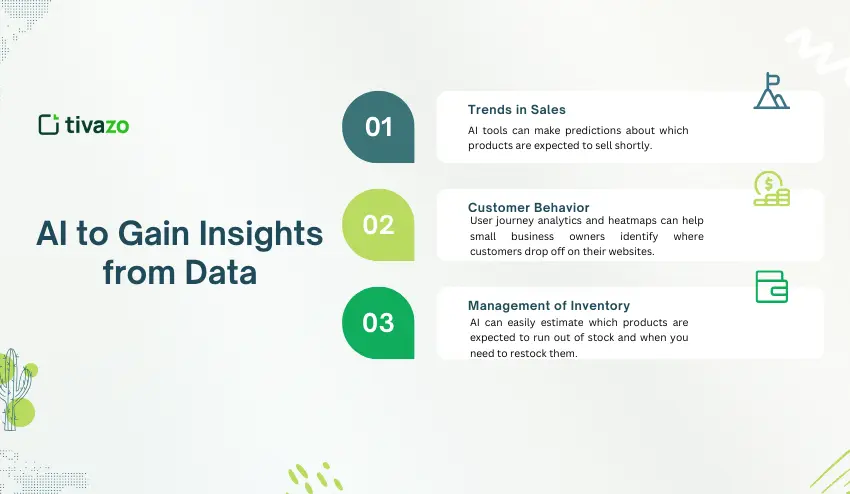
- Trends in Sales: AI tools can make predictions about which products are expected to sell shortly.
- Customer Behavior: User journey analytics and heatmaps can help small business owners identify where customers drop off on their websites.
- Management of Inventory: AI can easily estimate which products are expected to run out of stock and when you need to restock them.
Tools such as Power BI and Zoho Analytics allow small businesses to link different sources of data and insight into their key metrics.
6. Train Your Team for an AI-Driven Future:
It is also essential for small businesses to train their team members about how to use Artificial Intelligence, as they sometimes find it challenging to use AI in their assigned tasks. Such as they may fear about automation, face difficulties in adopting a new workflow, etc. Due to this, upskilling and training them is very important.
Some of the essential steps to train them are given below:
- Organize Webinars and workshops on AI basics.
- Provide them access to free online courses related to Artificial Intelligence.
- Assign them the first small AI tasks and ask them to share their insights.
Gerrid Smith, Founder & CEO of Fortress Growth, added, “Motivating a growth mindset in your team members can lead to a culture that can easily embrace innovation. Small businesses do not need to make every team member a scientist, but help them to understand how AI tool work and how they can use them effectively. This can be a powerful asset for small businesses.”
7. Consider Ethical and Legal Implications:
As small businesses begin to integrate AI into their business, it is fundamental to take into consideration how it will affect their employees, customers, and overall reputation. Compliance and ethics should be the priority.
Key Things to Consider:
- Privacy of Data: First of all, it is essential to make sure you comply with data protection laws like CCPA, GDPR, or your local equivalent.
- Discrimination and Bias: Be careful if you are utilizing Artificial Intelligence for decision-making or hiring processes. If you use biased data, it will automatically lead to biased results.
- Transparency: In addition to this, it is also essential to take care of transparency. Customers must be aware of when they are interacting with AI-powered tools.
8. Scale Strategically Over Time:
Once small businesses gained success with the integration of small AI, it’s interesting to go all in. But don’t forget that Artificial Intelligence is not a silver bullet; it should be used thoughtfully and linked with strategic aims.
Here are tips to wisely scale:
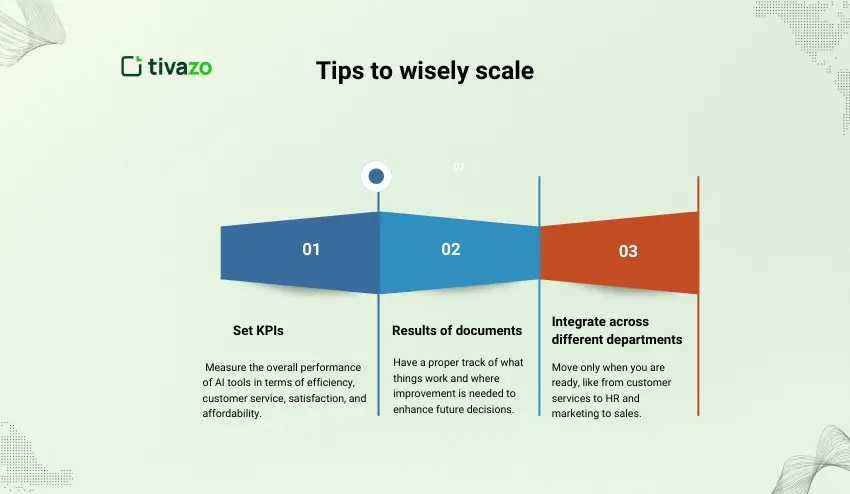
- Set KPIs: Measure the overall performance of AI tools in terms of efficiency, customer service, satisfaction, and affordability.
- Results of documents: Have a proper track of what things work and where improvement is needed to enhance future decisions.
- Integrate across different departments: Move only when you are ready, like from customer services to HR and marketing to sales. As you scale, leveraging services from a link building agency Novo can help strengthen your website’s authority, ensuring long-term growth in search engine visibility. As you scale, leveraging services can help strengthen your website’s authority, ensuring long-term growth in search engine visibility.
It is wise to revise your business needs, the readiness of the team, and the budget before expanding successfully.
Conclusion:
Thus, AI is considered a practical game-changer tool for the overall development of small businesses. Those businesses that are thinking of getting started with AI can follow these effective strategies and tips to help their businesses become successful in the competitive market.
